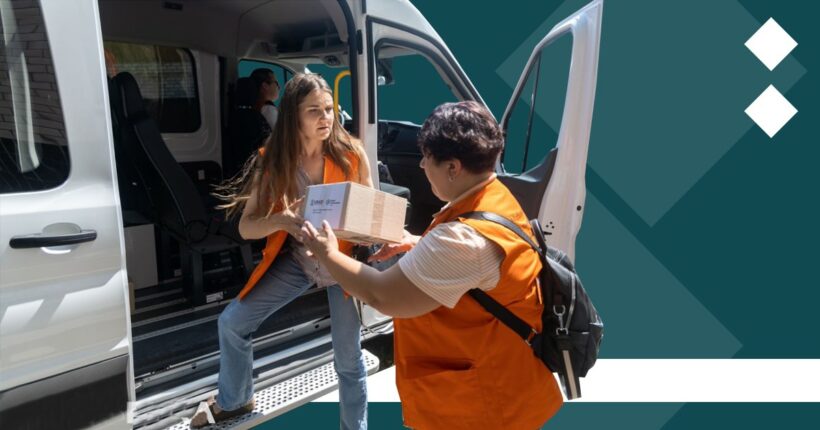
What is the problem?
After a significant decline in recorded cases of gender-based violence at the beginning of the full-scale invasion of the Russian Federation, the statistics went up again. In addition, in general, in martial law conditions, there were more cases of violence compared to previous years. According to experts, this is due to the crisis circumstances in which a significant part of the population of Ukraine found themselves.
What is the solution?
Help those who have suffered from violence and prevent its manifestations in the future. Creating mobile teams of social and psychological assistance is one of those solutions that help overcome the problem here and now. In Chernihiv, a mobile social and psychological assistance team has been working since August 2022 in close cooperation with law enforcement agencies. Rubryka visited one of the brigade's outings and talked with a client whom it managed to help.
Mobile teams work with the support of UNFPA, the United Nations Population Fund, in coordination with the Office of the Vice Prime Minister for European and Euro-Atlantic Integration and the Ministry of Social Policy of Ukraine. The mobile brigade in Chernihiv works thanks to the financial support of the US government (USAID Bureau for Humanitarian Aid) in cooperation with the implementation partner of the NGO Innovative Social Solutions.
How does it work?
"Our work is becoming more and more intense"
On a hot Monday afternoon, Olena Nadtochiy, the coordinator of the mobile brigade of social and psychological assistance in Chernihiv, meets us in the yard of the city's Social Services Center, where the brigade is stationed.
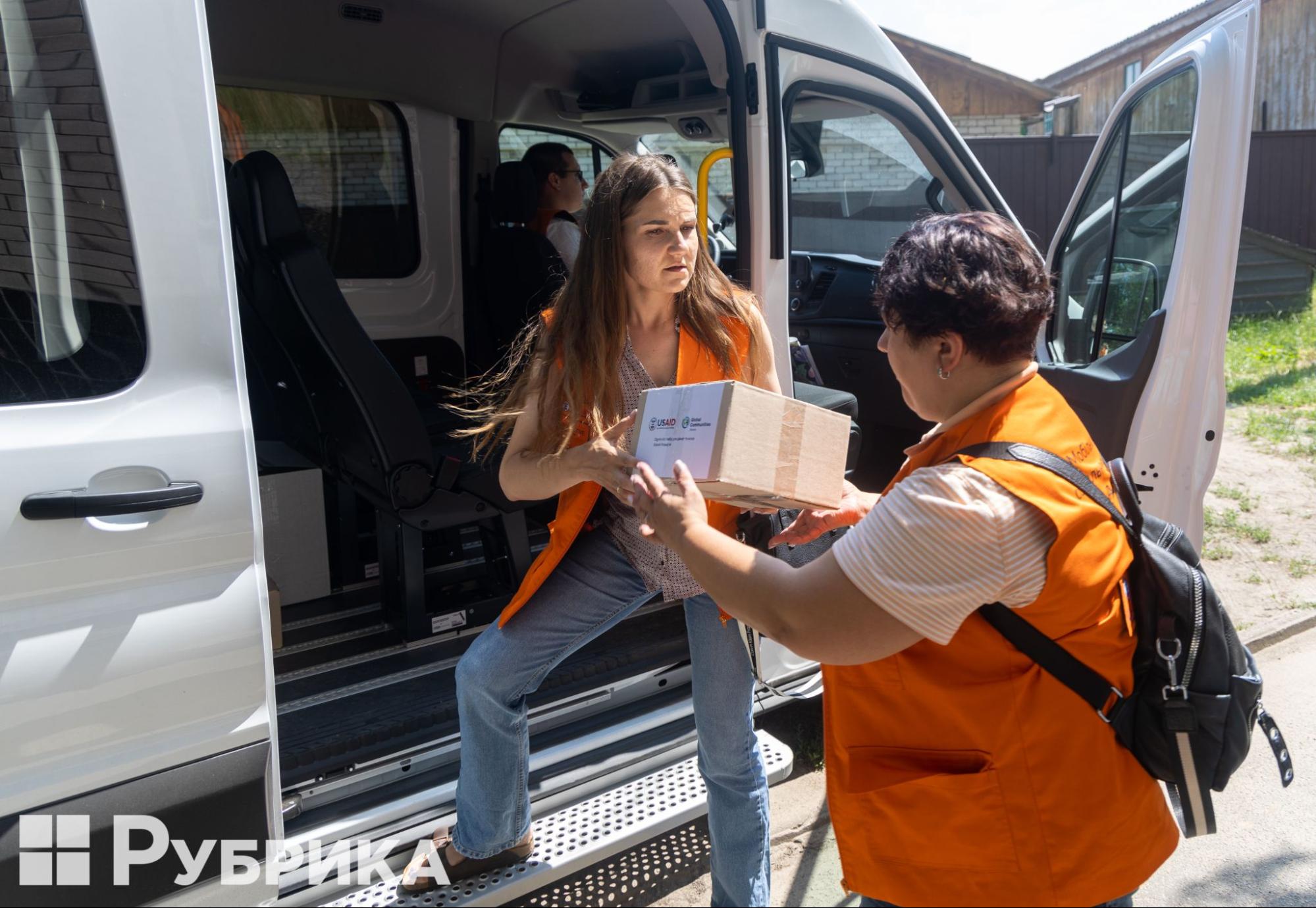
Photo: Brigade coordinator Olena Nadtochiy (right) and psychologist Zinaida Shedina unload humanitarian assistance that will be handed over to clients
"Every day, our work is becoming increasingly intense," Nadtochiy answers the question about the work schedule. Officially, the team starts work at eight in the morning and works until nine or ten in the evening. These are online and telephone consultations and scheduled or emergency visits. "We do planned visits to the families at the beginning of the week. As the coordinator, I draw up our route for the week and make these visits," Nadtochiy shared with Rubryka.
More and more often, the police, going on calls on domestic violence, provide the victims with the contacts of the mobile brigade, and immediately after the patrol leaves their homes, the victims start calling. "It's often a night call, but I have no right not to react — it's a matter of humanity," the project coordinator shares.
"First of all, it's about people"
A minibus of the mobile brigade is already waiting for us in the yard. Driver Andrii Nadtochiy says they received it a few months ago. The car is equipped, considering the needs of people with disabilities. Today, most of the space is occupied by boxes with humanitarian aid — the team receives it periodically thanks to the cooperation of UNFPA Ukraine with other organizations, so it can sometimes support clients in difficult financial circumstances.
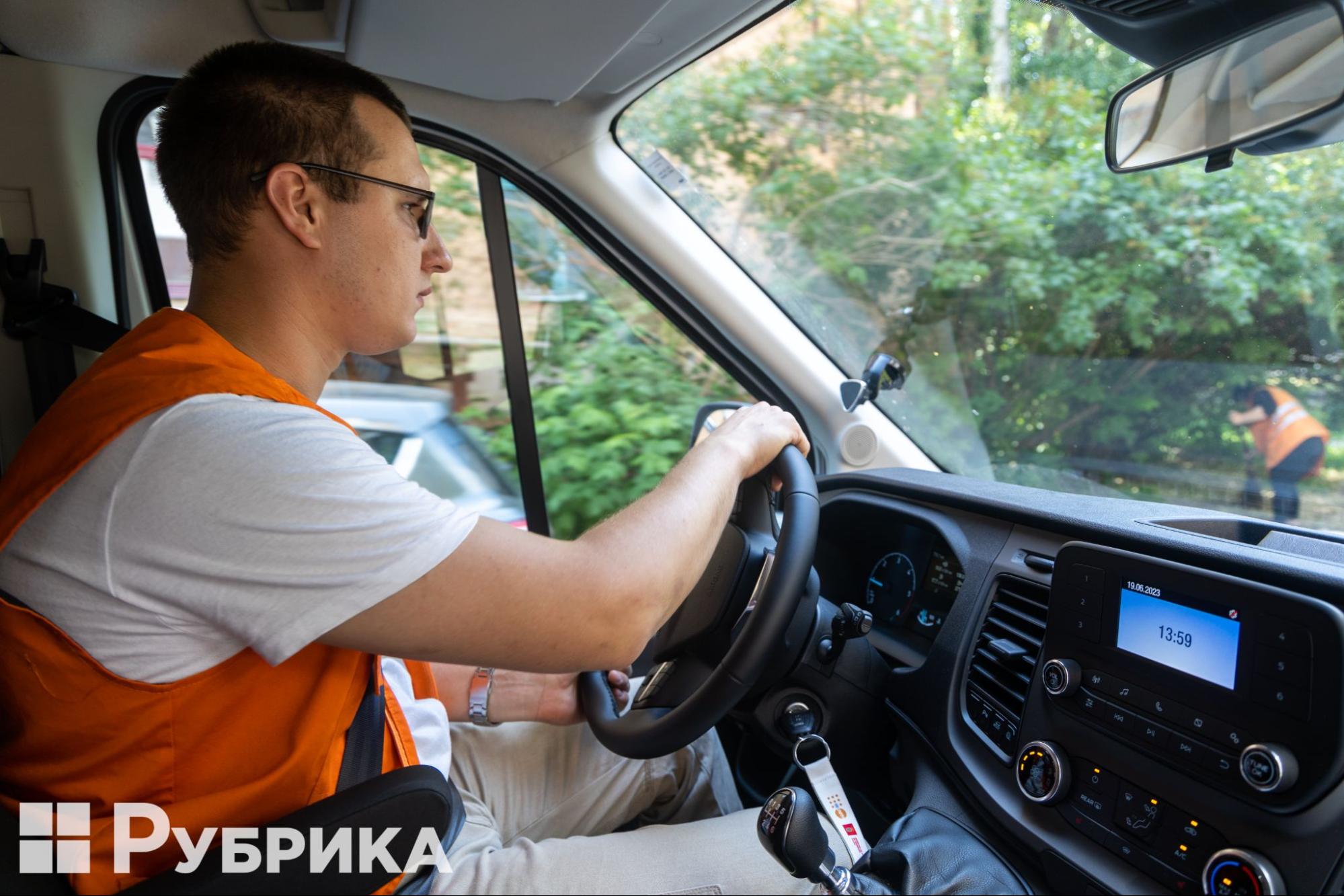
Photo: Mobile brigade driver Andrii Nadtochiy driving an inclusive minibus, which the brigade received a few months ago
Formally, the team is supposed to work only in Chernihiv, but in fact, it also assists clients from the suburbs and adjacent territories that have experienced Russian occupation. For example, just recently, they were in the village of Stary Bilous and Ripky.
"We receive requests from there and cannot help but respond. If we can, why not go?" says Olena Nadtochii. "First of all, these are people, and they deserve help."
The mobile team provides psychological first aid, stabilizes the emotional state of the injured person, and offers alternative options for behavior. Social and psychological services are provided free of charge and confidentially to people regardless of residence, state of health, age, and gender. If there is a need for help for children, they are redirected to the children's service or specialized NGOs. If we are talking about adults, then interaction with other organizations is also established. For example, when the crisis room did not work in Chernihiv, the mobile brigade placed the injured woman in a shelter in Kyiv.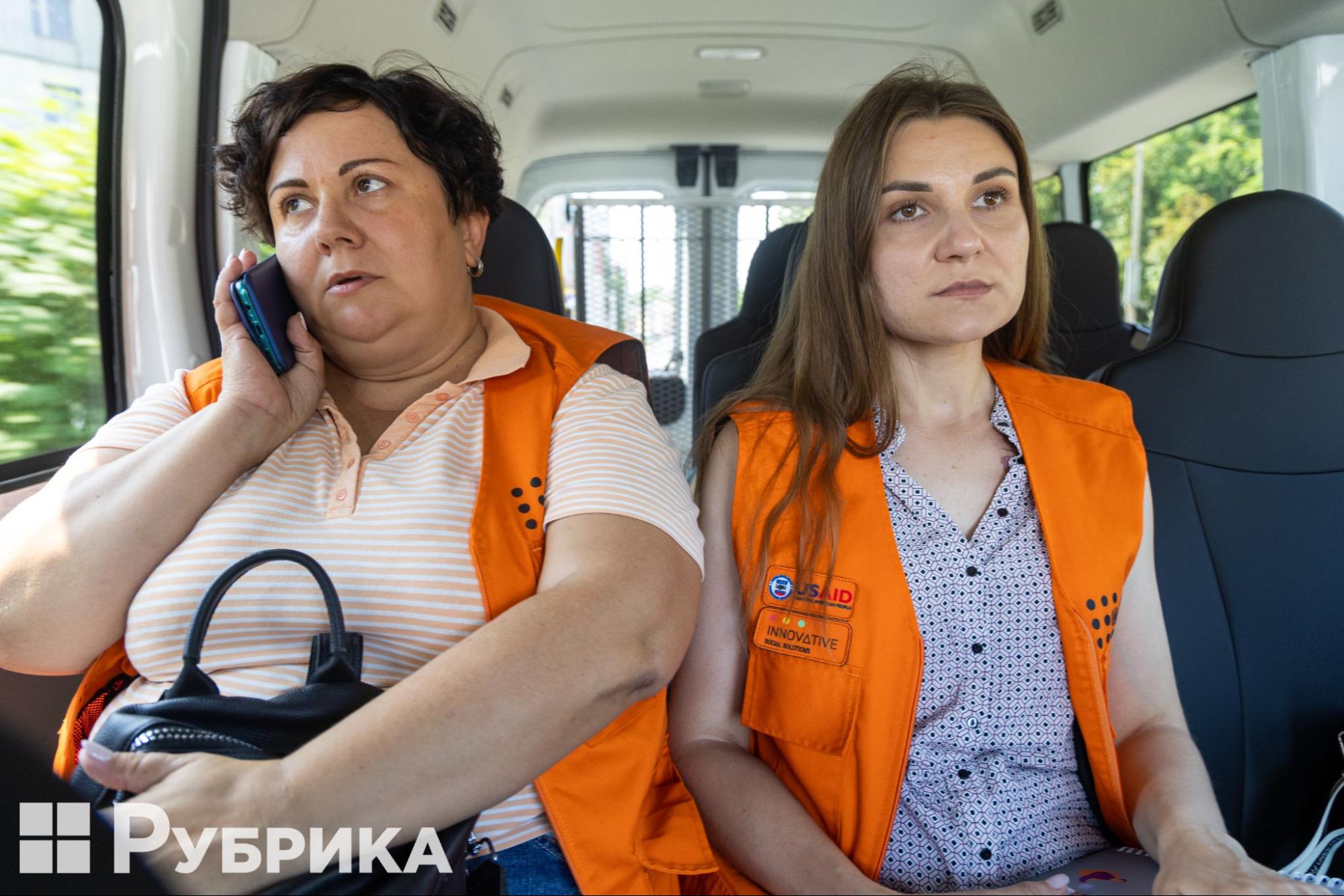 Photo: Psychologist Zinaida Shedina (on the left) consults a client by phone during the team's scheduled outing
Photo: Psychologist Zinaida Shedina (on the left) consults a client by phone during the team's scheduled outing
Mobile brigade psychologist Zinaida Shedina notes that during consultations, she first tells a person about the very essence of violence:
"We provide information about what it is. Sometimes this happens to a person, but they do not identify it as domestic violence," Shedina explains. "Then, when a person has expressed a desire to receive help, we select the work method more specifically, according to the situation, individually."
Next, we go on a visit to Chernihiv together with the brigade. We take our seats in the car, and the driver takes us for a monitoring visit to the woman with whom the brigade has been working since the fall of 2022. The woman agreed to share her story with journalists on the condition of anonymity.
"Aren't you afraid to ruin a child's life?!"
The client welcomes us with a smiling one-and-a-half-year-old baby.
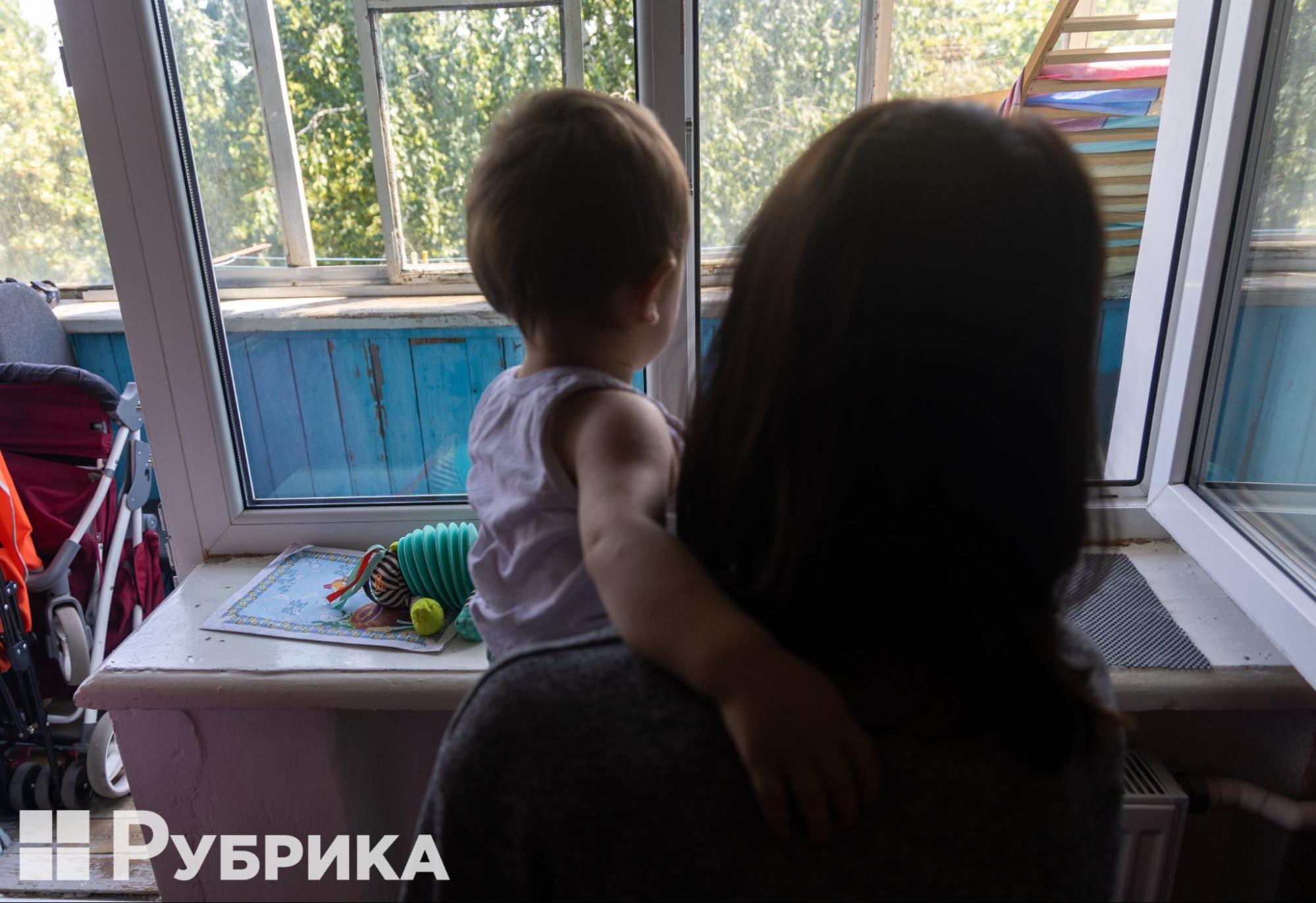
Photo: With the help of the brigade and the support of charitable NGOs, the client rents a separate apartment
"After working with specialists, I received many accusations from acquaintances like 'Aren't you afraid to ruin a child's life?! This is now a shame for the whole district!'" 31-year-old Tetyana (the name is changed at the client's request) told Rubryka. "And I say: 'You know, I'm so happy that I got out of that vacuum and closed circle of violence, that I'm happy about everything, and I'm not ashamed." She says that she was afraid it could cast a shadow on the child, but after interacting with the law enforcement officers, Tetyana realized it was the right decision.
"The police protected me physically, and the mobile brigade protected me psychologically, so I do not regret that I turned to the organization, and I do not refuse help," says the client.
Tetyana says that she lived with a partner and had a child together. At first glance, he did not look like a violent person, but the couple's relationship broke down, and misunderstandings began.
"We could not see eye to eye several times and constantly quarreled. We are educated people, and everything is fine, but the quarrels continued and continued," Tetyana recalls. "Once we started to quarrel in front of the child, and it came to physical violence."
At that moment, Tetyana had no one to turn to. She called the police, and they advised a mobile brigade. Olena and Zinaida immediately came to her aid and continued to support Tetyana.
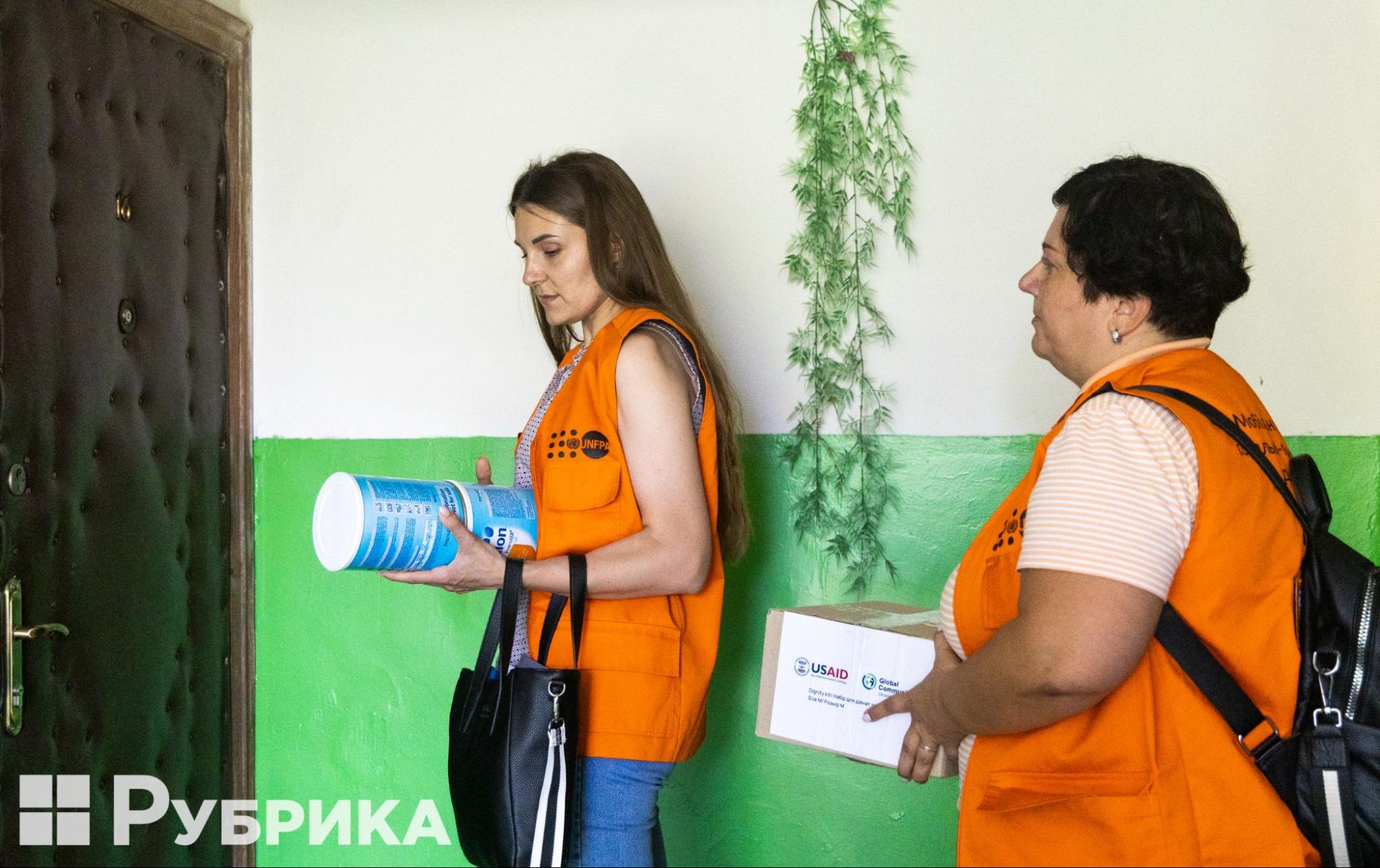
Photo: The mobile team brought help to the client for her and the baby
Nadtochii recalls that Tetyana was in a very difficult psycho-emotional state then. The brigade stabilized the victim's condition and fully accompanied her for the next few days: they provided humanitarian aid and transported her to a safe place. Tetyana started working with psychologist Shedina.
"My advice to others: we are afraid to bring our problems to the outside because it is shameful, but there is no need to be afraid," says Tetyana. "When I asked for support, I saw a problem. It is difficult to assess your condition yourself, so it is necessary to contact someone and communicate. Otherwise, you can harm your children. When I remember how the baby was worried, afraid, and cried when he saw this, I don't care what others say. A child's tears are not worth it."
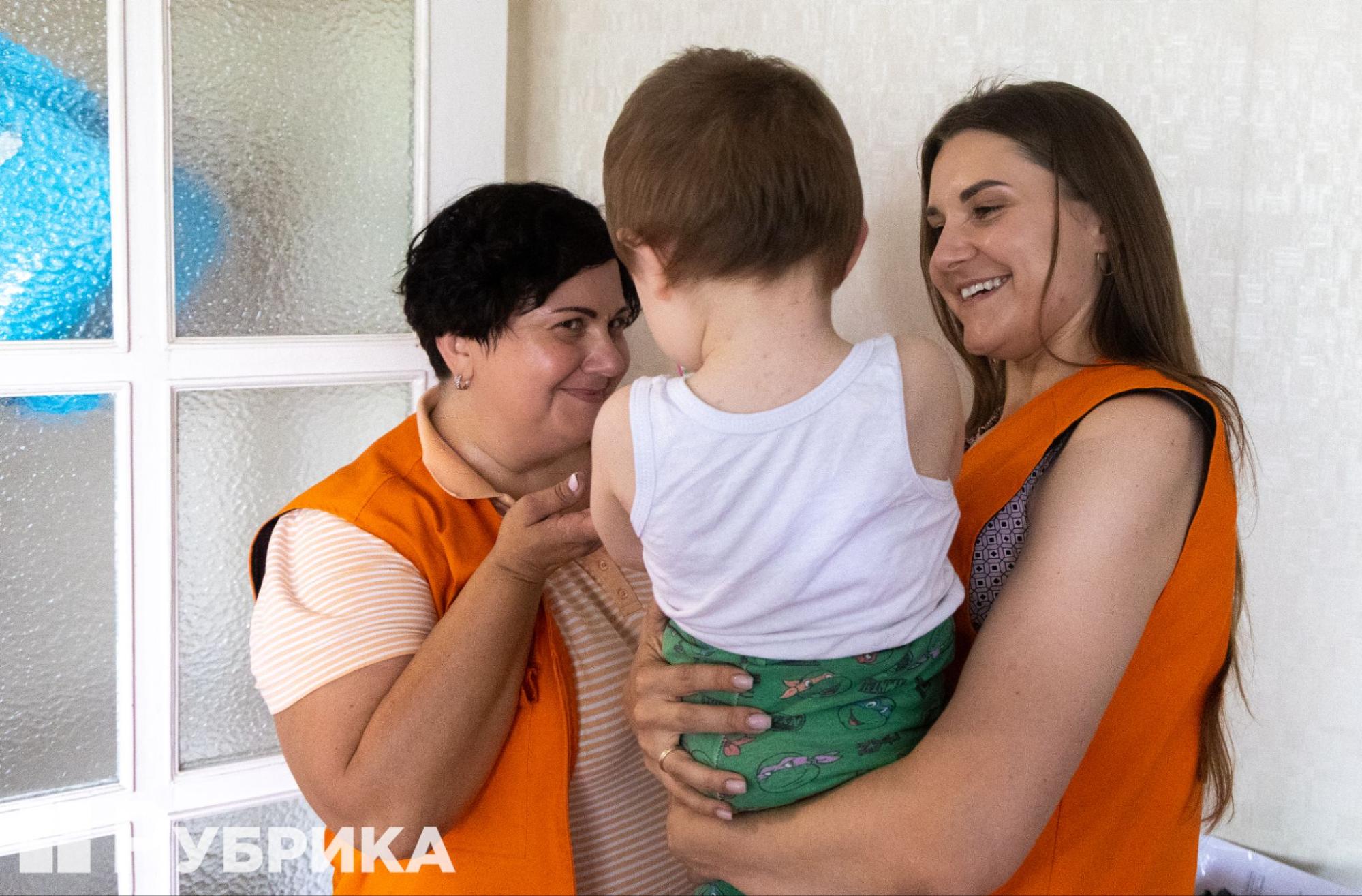 Photo: Shedina and Nadtochiy are happy that thanks to the timely appeal of the mother, her child did not suffer psychological trauma
Photo: Shedina and Nadtochiy are happy that thanks to the timely appeal of the mother, her child did not suffer psychological trauma
"Ruining life is when you do nothing, and the child will watch and then bring the same violence into their life and be either a victim or a perpetrator," comments the coordinator of the mobile brigade. "If a woman decides to fight against difficult life circumstances, then she deserves a lot of respect for her courage and strength of spirit, that she finally dared and took some steps to change the situation for the better."
Does it really work?
"They gave me the strength to live alone and rely only on myself"
Now the mobile team periodically makes monitoring visits to Tetyana and continues to provide humanitarian and psychological assistance. The team is happy that the result is visible: Tetyana's psycho-emotional state has improved, and the child did not receive psycho-trauma because their mother reacted in time.
Tetyana shares that she is grateful to the mobile brigade for their recommendations on caring for a child and arranging the home to ensure the baby's comfort. After all, she is a young mother, and no such close people around could share their experience and support with her.
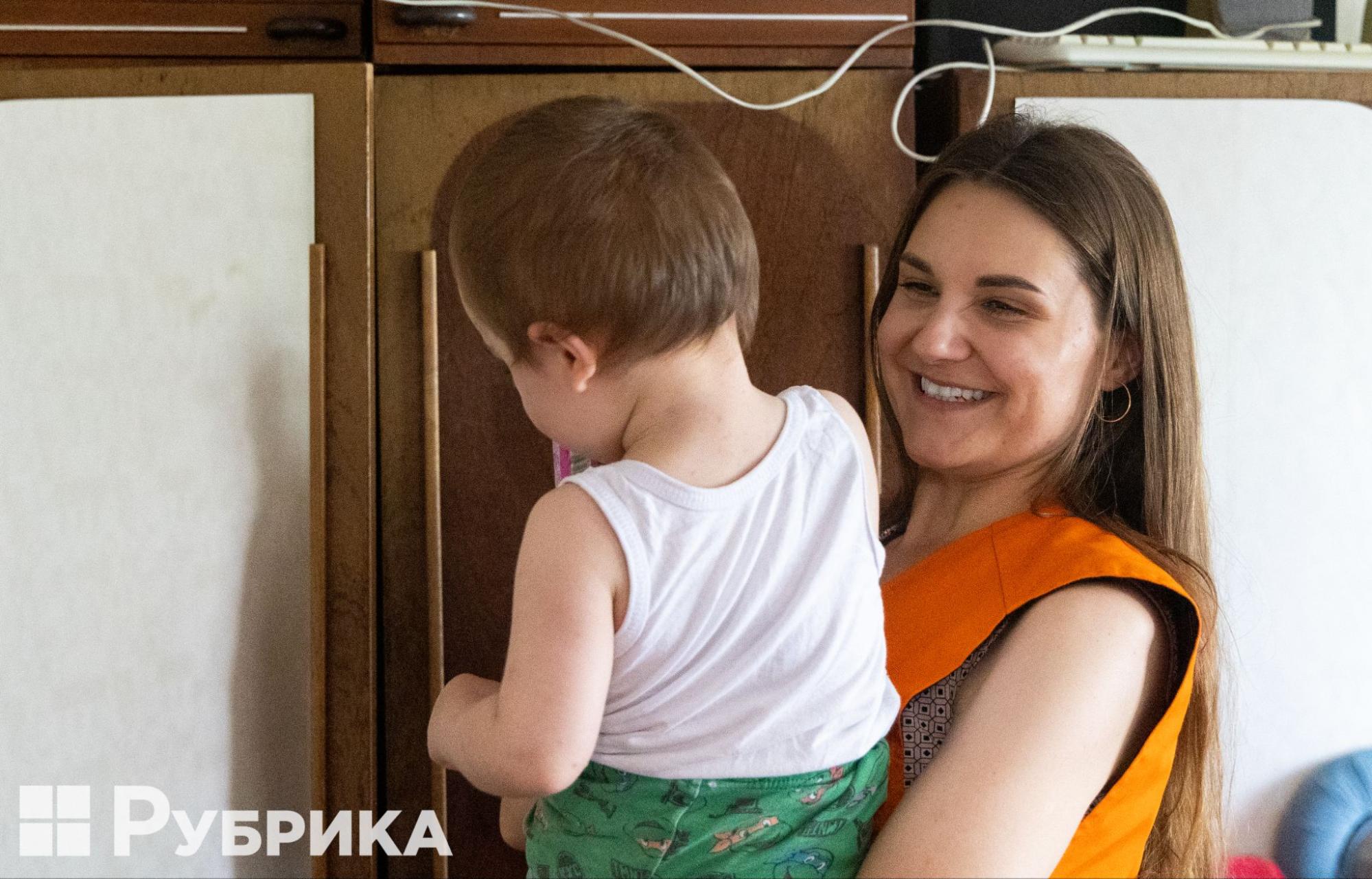
Photo: Nadtochyi says that during the time of working with the client, there have been qualitative changes for the better
Most of all, Tetyana is grateful for the psychological help. "They talked to me and gave me life advice that gave me the strength to live alone and not rely on anyone but on my own strength," the client shared with Rubryka. "I was so inspired that I would not give up and be strong. This was the most important thing for me."
"People are not afraid to ask for help"
Why the increase in violence statistics is not only a disadvantage
"Violence is not interested in age, sex, or social status of a person — it is everywhere. Absolutely," says Nadtochiy, based on her own experience.
In the first half of 2023, the mobile brigade detected 330 cases of gender-based violence. During these six months of work, about a thousand consultations were held in various forms.
"Every week, the number of reports of violence is increasing. And unfortunately, this number will increase since there is such an important category of people as demobilized military personnel," says the coordinator of the mobile brigade. Back in 2020, the Ministry for Veterans Affairs noted the need to screen the psychological state of military personnel after demobilization due to the risks of increased violence.
The situation where the offender is a military serviceman requires specialized assistance, the brigade members explain. Sometimes it is very difficult to help a woman when you come to a spot because the first step is to stabilize the abuser, who is potentially dangerous to everyone, not just family members.
Shedina adds: service members are heroes, and those of them who, upon returning home, will be in a complex psychological state, are not to blame for this. In her opinion, it is necessary to create several rehabilitation centers in each region, which will deal not only with the physical but also with veterans' psychological and psychotherapeutic rehabilitation.
Nadtochiy says now there is a tendency of increased appeals to psychologists. People seek help when they understand that they cannot cope with problematic situations independently. "Unfortunately, people who are potentially the most vulnerable category still have an insufficient level of awareness and mostly do not apply. They are in the risk group," the specialist notes.
In addition, no one canceled the complex psycho-emotional state of people during the war in general.
Most of all, the team records cases of psychological violence as it accompanies manifestations of any other: economic, sexual, and physical. The specialists state that there is also a lot of physical and sexual violence.
"Even in families where there was no violence before, there are cases when people simply explode. Children look at this and transfer violence into their picture of the world. This is how violence is transmitted like a relay," says Nadtochiy.
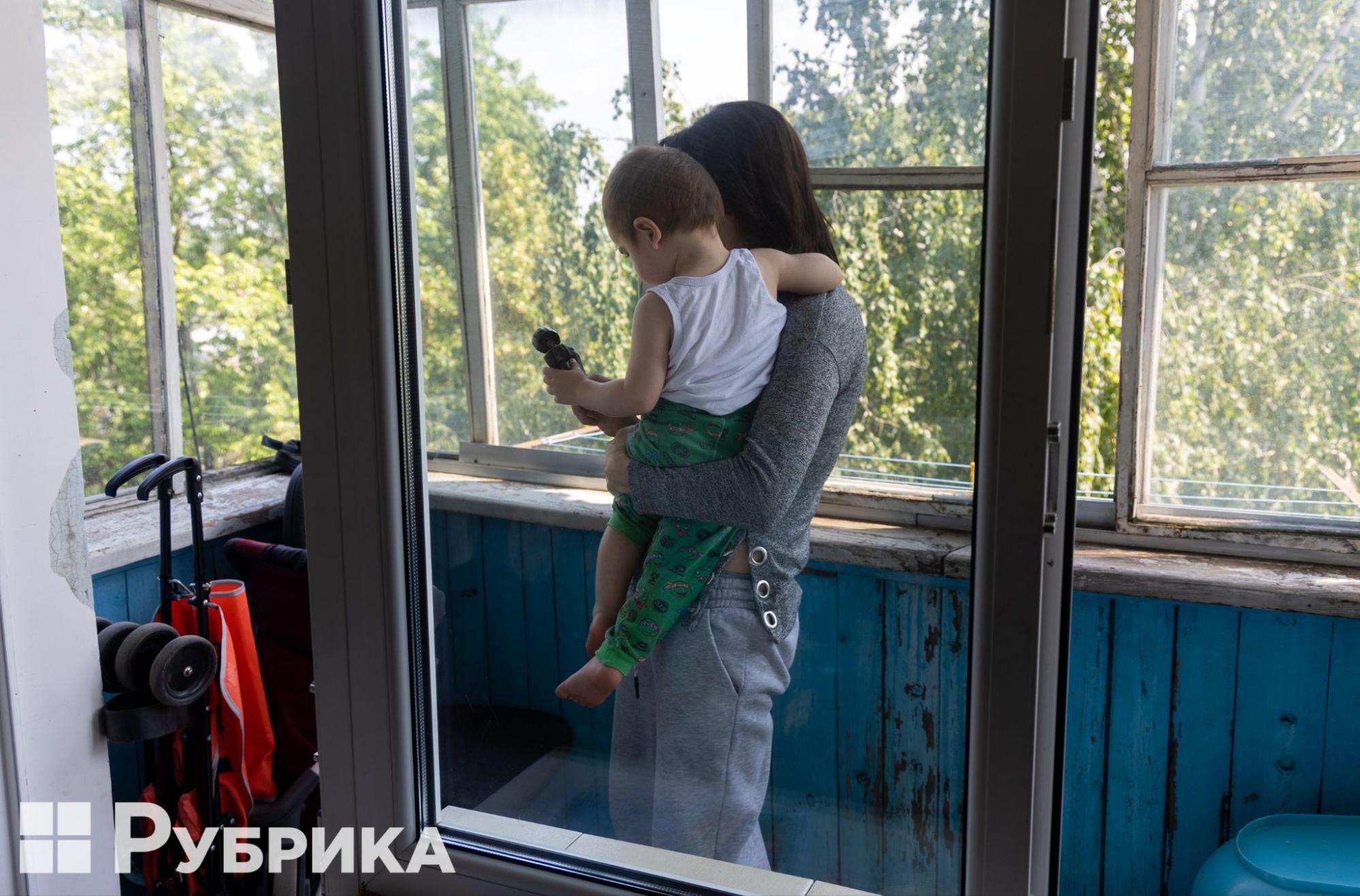
Photo: A client of the mobile brigade holds her son in her arms. She says that her partner did not give the impression of a man capable of violence, but she was still abused
At the same time, the increase in recorded cases has a positive component, according to the members of the mobile brigade. After all, they are recorded through appeals — to the police and the brigade. This indicates that people are ready to seek help and change their lives. "People already know about us in the city, in the district, they know about us even in other districts of the region. People know where to go, so this increase is also because people are informed and are not afraid to go. This is very important," emphasizes the coordinator.
When the number of recorded violence cases is small, this does not mean it is like that. Violence remains undetected. For example, only four cases of rape of women and girls by Russian occupiers were officially recorded in the Chernihiv region. In reality, there are more such cases. It's just that people are still afraid to talk about it, Nadtochii is convinced. Andriy Nadtochiy, the driver of the mobile brigade, adds: "I didn't think there was so much violence, and even men suffer — I did not know this before." The driver has been working on the project since its very beginning in August 2022.
What other solutions are necessary?
Other measures are also needed to address domestic and gender-based violence. After all, this is a complex work that must have many aspects. Among them, for example, are the following:
- Work with offenders
Currently, many efforts of the state and non-state, in particular international organizations, such as UNFPA Ukraine, are aimed at helping victims of violence. But there is no work with offenders, experts of mobile brigades say.
Tetyana's partner, for example, realizes that he may be punished, and this fear restrains him from acts of violence. "There are offenders who are not restrained by anything. We have a client who has no eye due to abuse. At the same time, the offender continues to behave as before," says Nadtochiy. In her opinion, this happens because there is no adequate punishment. Fines and community service, unfortunately, are not too scary nowadays.
"We worked with the woman who to the abuser, and no one worked with the offender. And accordingly, what happens? Repeated cases of violence. Therefore, it should be multidisciplinary work, and work with the offender should include punishment and therapy," adds psychologist Shedina.
- Nationwide program for psychological and psychotherapeutic rehabilitation of demobilized servicemembers
Nadtochiy believes that the state now has an understanding of such a need. However, the war is ongoing, and resources are primarily directed at protecting Ukrainian territories. With consequences for the mental health of the people who defend these territories, they will work later. So far, there are very few services to help this population category.
Nadtochiy tells about one of the cases of the emergency team. The abuser had two contusions but was calm and had no unusual aggressive reactions.
"You could talk to him, but I got the impression that his psyche was clearly disturbed," Nadtochiy recalls.
There is a psychologist in the team, not a psychotherapist or psychiatrist, and crisis intervention should be carried out at different levels, says the coordinator of the mobile team. "Psychological assistance is the third level, and psychotherapeutic and psychiatric assistance is already the fourth. That is, the fourth level must be involved here."
- The attention of local authorities to similar projects
"Everyone should be interested in the continuation of this UNFPA Ukraine project or, if it ends, in the local authorities continuing the activities of such specialized services," Nadtochiy is convinced. "We have extensive coverage, and the victims receive high-quality help. In addition, we have established cooperation with all social structures."
In addition to the center of social services, these are specialists in juvenile prevention, police units explicitly aimed at preventing and combating domestic violence, patrol police officers, and other institutions.
- Measures to prevent professional burnout of the team's specialists themselves
"There are cases when communication with colleagues or mentors would greatly facilitate our subjective perception of the situation because sometimes we have to look from a different point of view," says Nadtochiy.
She says, for example, that the recent weekend nights were sleepless. On Saturday, for five hours, Nadtochiy provided urgent help by phone to a woman who had attempted suicide. Her psychological state was stabilized, and the victim even called an ambulance. Currently, Nadtochiy conducts routine telephone consultations for her.
The next night, Nadtochiy and a colleague helped an elderly woman suffering from economic, physical, and psychological violence. Already this Monday morning, they went to the victim in the suburbs of Chernihiv in a brigade bus, brought her food, and fed her. Since the victim refused to leave her residence, the team is currently directing the attention of social services to her.
Specialist teams say they are already experiencing professional burnout and would like to undergo therapy with specialists in this field.
War gives a chance to grow up
War causes the transformation of people in many aspects, including personality maturity, Shedina shares the observation. "The more people change their outlook and thinking, leaving the role of a victim and taking on the role of an adult, the more problems in society, in general, will be solved," the psychologist is convinced.
"Today, with the ratification of the Istanbul Convention on Preventing and Combating Violence Against Women and Domestic Violence, Ukraine is starting to not only look at violence as a phenomenon that exists. It begins to look at the root, to work with the processes that generate it. It's already about quality and comprehensive work," says Nadtochiy.
The coordinator of the Chernihiv mobile brigade of social and psychological assistance summarizes: "I really hope that everything we do will have positive consequences — both for the victims and for the children who, unfortunately, witness the violence."
In Chernihiv, the mobile team of social and psychological assistance can be contacted by phone number +380960368713
The brigade works on the basis of the Center of Social Services at the address of the city of Chernihiv, str. Hlibopekarska, 24a.
The material was prepared within the framework of the Program for Combating and Preventing Gender-Based Violence of UNFPA, the United Nations Population Fund, with the support of the US government (USAID Bureau of Humanitarian Assistance).
Photo: Mykola Tymchenko

"You cannot overcome grief with tears — only with actions": the mobile team of social and psychological assistance helps violence victims overcome their challenges
Newsletter
Digest of the most interesting news: just about the main thing





